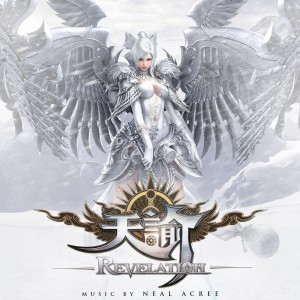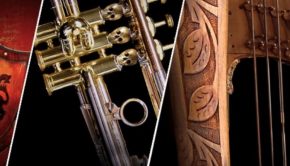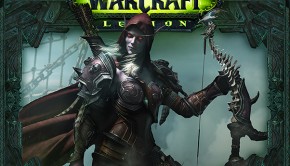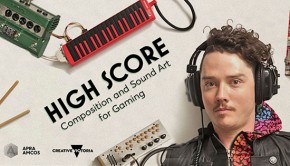Revelation Original Soundtrack
 |
Album Title: Revelation Original Soundtrack |
| Record Label: Varese Sarabande |
|
| Catalog No.: N/A |
|
| Release Date: April 29, 2016 |
|
| Purchase: Purchase on iTunes |
Overview
One of the first game soundtracks to published and released by the traditionally film-oriented Varèse Sarabande, Revelation Online is Neal Acree’s most recent MMO score. Revelation, a game by NetEase, is an online fantasy RPG initially released in Asia with a soundtrack very indicative of the game’s Chinese origins. The game’s Western release has been met with a series of obstacles, but the soundtrack has now been officially released both digitally and in CD format.
Body
Acree places the score to Revelation on a relatively solid pentatonic scale and brings in a slew of traditional Asian instruments, highlighting the Eastern influences of the game. The main theme of the game – “The Chosen” – features an erhu playing a decending melody that increases in power once more percussion is added. The melody is used frequently throughout the score, which binds the album together, as the melody is both simple and memorable, and lends itself well to variation.
The overall mood of the soundtrack is very relaxed, without nearing ambient. “Cloudfall City,” the second track on the album is one such example – after a brief burst of brass, the forefront of the piece is a series of plucked instruments and pitched percussion with a wall of strings playing some aimless notes in the background. Occasionally interrupted by pipes, the piece is a great example of the upcoming album. The various tracks play lackadaisical melodies and are always saturated with rich instrumentation that keep the pieces alive during the less eventful moments.
As lush as this score is, I was surprised at how drawn I was to the more bare tracks. In the midst of music packed with layers of harmonies, rich and varied acoustic instrumentation, and steeped in just a few prominent melodies, the pauses are much more impactful than they might be in another score. “Oracle Academy” uses heavy reverberation to support a guzheng idly plucking away, here and there picking up drifts of melodies and finding a rhythm along the way. “Forever Gone Desert” might be an ambient track in another score but for the live instrumentation that give it depth. On some level, I want to skip ahead to the next track, but the roughness of the live instruments are so soothing.
My favorite of these calmer tracks – and perhaps my favorite of the album – comes with “Lost Forest,” a tantalizingly haunting and simple track using plucked strings, pitched percussion, pipes, and judicious mixing. The melody consists of phrases that never quite resolve, creating a sorrowful and piercing. Although the melody is repeated often, over new instrumental combinations each time, it’s only at the very end of the track that the harmony really resolves (and even then, it’s not before a few teased ending phrases).
As full as the soundtrack is with a range of Asian instruments, from the Chinese pipa to a Japanese shamisen facilitating a few of the melodies, it’s not without some great western instrument performances, as well. A rich cello shows up from time to time, which was an unexpected appearance until I saw Tina Guo listed on the album’s credits. “Holy Wings” is one of the longest tracks on the album and combines both the cello and the vocals of Uyanga Bold coming together to give the whole track an ethereal and otherworldly – but very acoustic – sound. “Jade Maple Village” features Guo very prominently at the beginning with a beautiful rendition of one of the themes of Revelation. Her instrument is soon swallowed up by the other pipes and strings, but returns just as powerfully in “Destiny” in a drawn-out variation of the main theme.
The more dramatic tracks bring in deep, low percussion, reminiscent of the percussion in the opening theme “The Chosen.” “Into Battle” combines a slew of dissonant notes with this type of percussion for a battle version of the main theme. “Lair of the Wolf” opens with a newer rhythm on the same bass drumbeats. This piece builds up a few layers as it goes; after the percussion has tattooed a solid rhythm, it is joined by double bass, low brass, and some higher accents later on alongside harsh vocals. “The Spider Queen” uses an appropriate eight-beat pattern to accelerate the piece alongside a whirling string motif (reminiscent of “Shelob’s Lair” from Howard Shore’s Return of the King, albeit with an Asian flair).
The album ends with two solid tracks; they each have a type of growth and development absent on many of the other pieces on the album. “Sword Spirit of the White King” opens with a few slow drumbeats that alerts the listener of drama to come, although it builds slowly. The beat breaks down into subdivisions as the instruments climb up to higher octaves. It sounds as if the piece is meant for some great boss battle as it builds slowly and deliberately across its three-minute span – lengthy for this album, and features a subdued but strong melody which reminded me a little of Soule’s Guild Wars 2. “The Battle of the Five Emperors” closes the album; it develops in the same way as “Sword Spirit,” it features the same melody of the main theme, making it a fitting ending piece. If we are to go by the same indications as the rest of the tracks on the album, the use of drums (not to mention the title) certainly suggests a battle track – and indeed, before the final, triumphant iteration of the melody, we hear nothing but fierce percussion to prelude the last musical phrases of Revelation. The last few seconds of the album are the echoes the final notes of the track end abruptly and powerfully.
Summary
The score to Revelation is a small and unexpected powerhouse. The vivid array of traditional instruments and acoustic performances, combined with Penka Kouneva’s brilliant orchestration, gives Revelation a sense of realness often lacking in today’s epic score. Acree manages to create a great musical theme for the game without it feeling contrived, and embeds it throughout the score – triumphantly, calmly, or darkly. There are no wasted instruments or melodies. While the relatively quiet nature of the game’s release may have sidelined this score, Revelation is absolutely a worthy soundtrack for orchestral score enthusiasts.
Do you agree with the review and score? Let us know in the comments below!
5
Posted on June 6, 2016 by Emily McMillan. Last modified on June 6, 2016.














